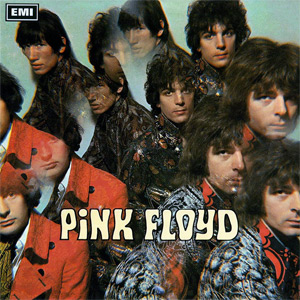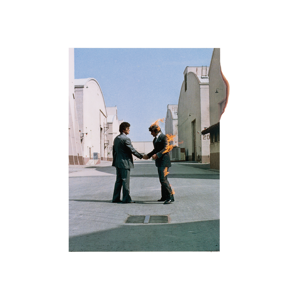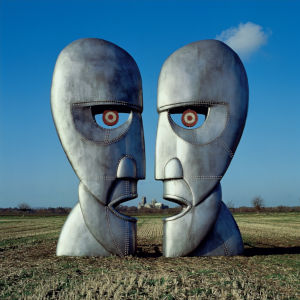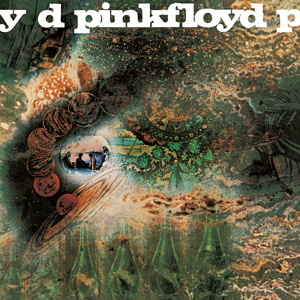
The Wall is the eleventh studio album by English rock band Pink Floyd, released in 1979 through Harvest and Columbia Records. Conceived during the In The Flesh tour, recording spanned nearly a year, from December 1978 to November 1979, and took place in France, England, New York, and Los Angeles. It was produced by Bob Ezrin, who helped to refine the concept and bridge tensions during recording. Some of the outtakes from the recording sessions were used on the band's next album, The Final Cut (1983).

Animals is the tenth studio album by English rock band Pink Floyd, released on 21 January 1977 through Harvest and Columbia Records. It was recorded at the band's Britannia Row Studios in London throughout 1976, and was produced by the band. The album continues the longform compositions that made up their previous works, including Wish You Were Here (1975). The album received positive reviews from critics and was commercially successful, reaching number 2 and 3 in the UK and US, respectively. Since its release, it has sold over 5 million copies worldwide.

George Roger Waters is an English songwriter, singer, bassist, and composer. In 1965, he co-founded the progressive rock band Pink Floyd. Waters initially served as the bassist, but following the departure of songwriter Syd Barrett in 1968, he also became their lyricist, co-lead vocalist, and conceptual leader.

David Jon Gilmour, is an English guitarist, singer and songwriter who was a member of the progressive rock band Pink Floyd. He joined the group as guitarist and co-lead vocalist in 1968 shortly before the departure of founding member Syd Barrett. Pink Floyd subsequently achieved international success with the concept albums The Dark Side of the Moon, Wish You Were Here, Animals, and The Wall. By the early 1980s, they had become one of the best-selling and most acclaimed acts in music history; by 2012, the band had sold over 250 million records worldwide, including 75 million units sold in the United States. Following the departure of Roger Waters in 1985, Gilmour assumed leadership of Pink Floyd; they released three more studio albums before disbanding in 2014.

The Piper at the Gates of Dawn is the debut studio album by the English rock band Pink Floyd, and the only one made under founding member Syd Barrett's leadership. The album, named after the title of chapter seven of Kenneth Grahame's The Wind in the Willows and featuring a kaleidoscopic cover photo of the band taken by Vic Singh, was recorded from February to May 1967 and released on 4 August 1967. It was produced by Beatles engineer Norman Smith and released in 1967 by EMI Columbia in the United Kingdom and Tower in the United States, in August and October respectively. Two of the album's songs, "Astronomy Domine" and "Interstellar Overdrive", became long-term mainstays of the band's live set list, while other songs were performed live only a handful of times.

Wish You Were Here is the ninth studio album by the English rock band Pink Floyd, released on 12 September 1975 through Harvest Records and Columbia Records, their first release for the latter. Based on material Pink Floyd composed while performing in Europe, Wish You Were Here was recorded over numerous sessions throughout 1975, at Abbey Road Studios in London.

Atom Heart Mother is the fifth studio album by the English progressive rock band Pink Floyd. It was released by Harvest on 2 October 1970 in the UK, and by Capitol on 10 October 1970 in the US. It was recorded at Abbey Road Studios in London, England, and was the band's first album to reach number 1 in the UK, while it reached number 55 in the US, eventually going gold there. A remastered CD was released in 1994 in the UK and the United States, and again in 2011. Ron Geesin, who had already influenced and collaborated with Roger Waters, contributed to the title track and received a then-rare outside songwriting credit.

Meddle is the sixth studio album by English progressive rock group Pink Floyd, released on 31 October 1971 by Harvest Records. It was produced between the band's touring commitments, from January to August 1971. The album was recorded at a series of locations around London, including Abbey Road Studios and Morgan Studios.

A Momentary Lapse of Reason is the thirteenth studio album by the English progressive rock band Pink Floyd. It was released in the UK and US on 7 September 1987 by EMI and Columbia. It was recorded primarily on guitarist David Gilmour's converted houseboat, Astoria. Its production was marked by a legal dispute with former member Roger Waters, who departed in 1985, as to who owned the rights to the band's name, an issue resolved several months after the album was released.

The Division Bell is the fourteenth studio album by the English progressive rock band Pink Floyd, released on 28 March 1994 by EMI Records in the United Kingdom and on 4 April by Columbia Records in the United States.

A Saucerful of Secrets is the second studio album by the English rock band Pink Floyd, released on 29 June 1968 by EMI Columbia in the United Kingdom and released on 27 July 1968 in the United States by Tower Records. The album was recorded before and after Syd Barrett's departure from the group. With Barrett's behaviour becoming increasingly unpredictable, he was forced to leave the band and David Gilmour was recruited in January 1968.

The Final Cut is the twelfth studio album by English rock band Pink Floyd, released on 21 March 1983 in the United Kingdom and on 2 April in the United States through Harvest and Columbia Records. It comprises unused material from the previous Pink Floyd record, The Wall (1979), alongside new material recorded throughout 1982.
"Atom Heart Mother" is a six-part suite by the progressive rock band Pink Floyd, composed by all members of the band and Ron Geesin. It appeared on the Atom Heart Mother album in 1970, taking up the first side of the original vinyl record. At 23:38, it is Pink Floyd's longest uncut piece. Pink Floyd performed it live between 1970 and 1972, occasionally with a brass section and choir in 1970–71.

"See Emily Play" is a song by English rock band Pink Floyd, released as their second single in June 1967. Written by original frontman Syd Barrett and recorded on 23 May 1967, it featured "The Scarecrow" as its B-side. It was released as a non-album single, but appeared as the opening track of the American edition of their debut album The Piper at the Gates of Dawn (1967).
"Nobody Home" is a song from the Pink Floyd album The Wall. This song was one of several to be considered for the band's "best of" album, Echoes: The Best of Pink Floyd.

"Arnold Layne" is the debut single released by the English rock band Pink Floyd on 10 March 1967, written by Syd Barrett.
"Astronomy Domine" is a song by English rock band Pink Floyd. The song, written and composed by original vocalist/guitarist Syd Barrett, was the first track featured on their debut album, The Piper at the Gates of Dawn (1967). The lead vocal was sung by Barrett and keyboard player Richard Wright. Its working title was "Astronomy Domine ". "Domine" is a word frequently used in Gregorian chants.

Roger Keith "Syd" Barrett was an English singer, songwriter, and musician who co-founded the band Pink Floyd in 1965. Barrett named the group and was their original lead singer, guitarist and principal songwriter. He was ousted in April 1968 after David Gilmour took over as their new guitarist and was briefly hospitalised amid speculation of mental illness and his excessive use of psychedelic drugs.

Richard William Wright was an English musician, composer, singer, and songwriter. He was a founder member, keyboardist, and vocalist of the progressive rock band Pink Floyd, performing on all but one of the group's albums including The Piper at the Gates of Dawn, The Dark Side of the Moon, Wish You Were Here and The Division Bell, and playing on all of their tours.




















